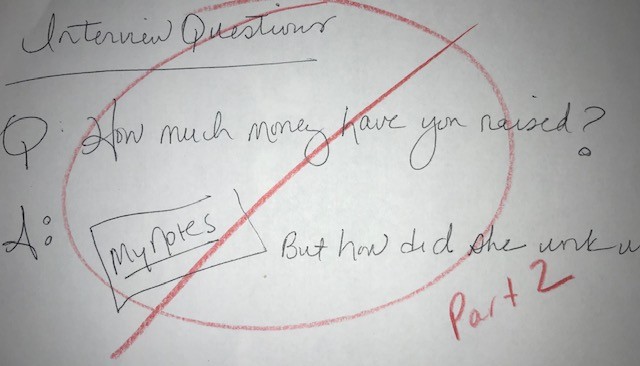
How much money have you raised?
This is the question you’ll never hear me ask in an interview. It makes me cringe. In Part 1, I address how this question is bad because it emphasizes money and you. Now Part 2 explores this question from the staff perspective.
Maybe you’ve been there. You’re in a group interview with your boss and colleagues. On the script, it is time for someone to ask the candidate, “How much money have you raised?”
Candidate A references his resume, where he details how he recently led a capital campaign that raised $10 million for his institution. He elaborates on his success during that campaign with building new relationships and broadening the base of supporters.
Candidate B highlights how she has closed over $15 million in her advancement career, starting with her days in annual giving. She details her accomplishments building programs at three different institutions, leaving them in a good place for the staff members who followed her.
Candidate C does not state a specific amount. Instead, she explains how she created new donor recognition programs, planned events, implemented engagement strategies, and managed an extensive portfolio of high net worth prospects.
Are any of these answers off base? Not really, especially based on the way the question is asked.
So why is this a bad question? My two main reasons:
· It leaves no room for candidates to address how they worked as a team. Every successful advancement program involves teamwork. Major donors rarely show up out of the blue. The team likely is a combination of staff, volunteers, and Board members. More important than the amount raised is how candidates worked externally and internally. How did each candidate collaborate with colleagues in charge of prospect research, stewardship, event planning, annual, major, and planned gifts, gift processing, marketing, etc.? It is important to find out how the candidates would work within your office culture, which moves to my second reason.
· It may imply your office culture places more value on the person closing the gift than those who support them. Take a moment to reflect how you celebrate success. To what extent do you recognize all staff for their roles in securing support? The gift officer secures gifts. The gift processor accurately records and acknowledges them. The stewardship director communicates impact by sharing stories with donors. The administrative assistant responds promptly to questions. The event planner puts on a flawless event where everyone feels positive about the organization, the prospect researcher provides important information to cultivate relationships and potential leads, the marketing and communications staff creates materials and crafts messaging to support ongoing efforts, and so on. Could it be that asking the question implies that you only value the work of the person who secures gifts?
Consider these options as alternatives:
· Tell about a specific time when you worked with another team member to secure a major gift.
· How do you convey the good news about receiving a gift?
· Describe how you got to know your prospects when you started your last job.
· Share when you learned a valuable piece of information from a colleague that helped build a meaningful relationship with a prospect.
· What was the most memorable introduction a fellow staff member made for you?
· What materials do you like to share with prospects on a first visit?
If you ask, “how much money have you raised?”, you may send red flags to a potential candidate that you do not operate as a team. Or you may hire someone who thinks she does it all on her own. Get to know how your candidates operate on a team – and if you’re not operating as a team, now is the time to start.
